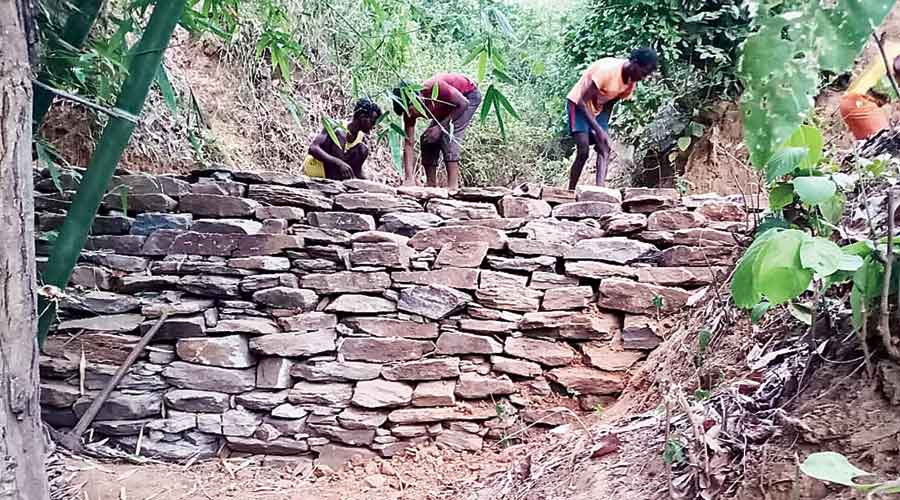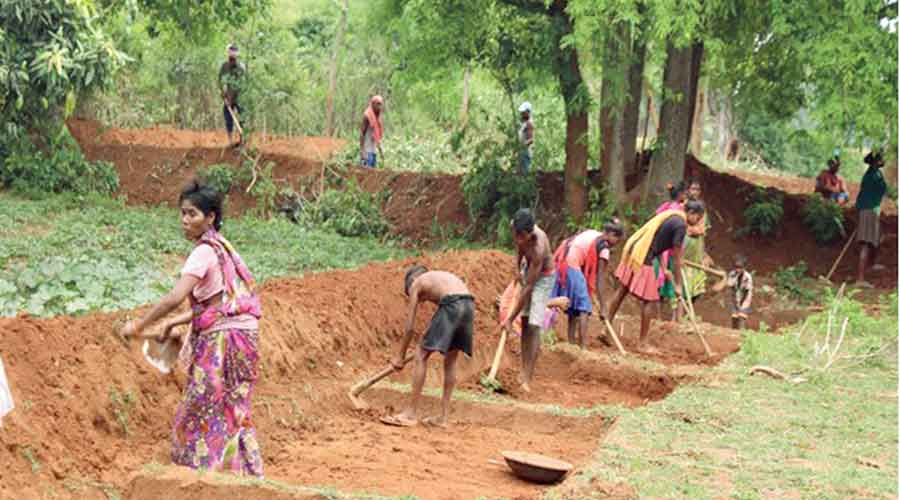The Jharkhand government has decided to hike the daily wage under the Mahatma Gandhi National Rural Employment Guarantee Scheme to Rs 225 using funds from its own coffers from April after the central government failed to consider its request to increase the amount from Rs 198.
Sources in the state rural development department said that according to the state-wise wage rate for unskilled manual workers notified by the Union ministry of rural development, the MGNREGA wage rate for Jharkhand and Bihar has been increased by a mere Rs 4 from Rs 194 in 2020-21 to Rs 198 in 2021-22.
“We are among the states with the lowest wage rate at Rs 194, above only Chhattisgarh and Madhya Pradesh, which have been set at Rs 193 each. We had requested the central government to increase the wage rate to Rs 225 in January. However, in the state-wise wage rate for unskilled manual workers issued by the Union government, the increase for Jharkhand (and Bihar) was only Rs 4. We again requested the Centre (to increase the wage rate) but received no response. We had no option but to increase the wage rate from our own funds. There seems to be no transparency in why and how these wage rates are determined for different states,” said a source in the chief minister’s office.
Under the Mahatma Gandhi National Rural Employment Guarantee Act, 2005, the Centre determines the state-wise wage rates for unskilled manual workers under the scheme. These rates are determined according to changes in the Consumer Price Index for Agricultural Labour, which reflects inflation in rural areas.
“The government should disclose the process by which they have increased the rate or the reasons why they have not. Are they increasing the wages arbitrarily or on political grounds or is it based on an index like the agricultural wage index?” asked an official in chief minister’s office.
“The MGNREGA is a lifeline for the rural poor. But people do not show much interest in working under the scheme due to poor wages. So, we have decided to enhance the wage from the existing amount fixed by the Centre at Rs 198 to Rs 225 from the state exchequer,” said chief minister Hemant Soren.
On January 2, Soren had announced at a public meeting that his government would spend out of its own pocket to raise the job scheme wage for workers in the state.
The scheme’s wages are fixed and paid by the Centre, which is accused of keeping them too low. In about half the states including Jharkhand, the job scheme wage is lower than the minimum wage fixed by the state government. The minimum wage rate in Jharkhand is Rs 283, while a labourer working under the rural job scheme used to get Rs 194 as minimum wage till March.

Workers at Seraikela-Kharsawan Bhola Prasad
When the job scheme was launched in 2006, the wage was linked to the minimum wage in every state. But since 2008, the job scheme wage has been revised in the light of the CPIAL for the state concerned, bringing it below the minimum wage in some states that revise wages through consultation.
Sources in the state rural development department further said that there are provisions in the MGNREGA under which a state can increase the minimum wage of workers from its own exchequer. Several states, including Bihar, have already done it. However, they have requested the Centre for creating a separate column for the state’s wage contribution in the management information system of the MGNREGA.
State MGNREGS commissioner and rural development director Aditya Ranjan said that the deputy commissioners and deputy development commissioners in all 24 districts of the state have been directed to pay the increased wage rate for work under the rural job scheme effective from April 1.
Additional reporting by Basant Kumar Mohanty in Delhi











